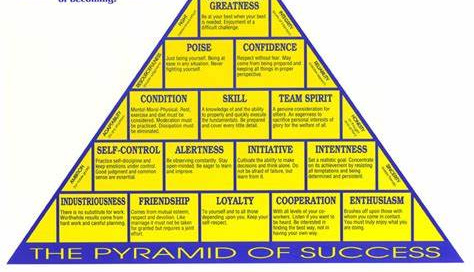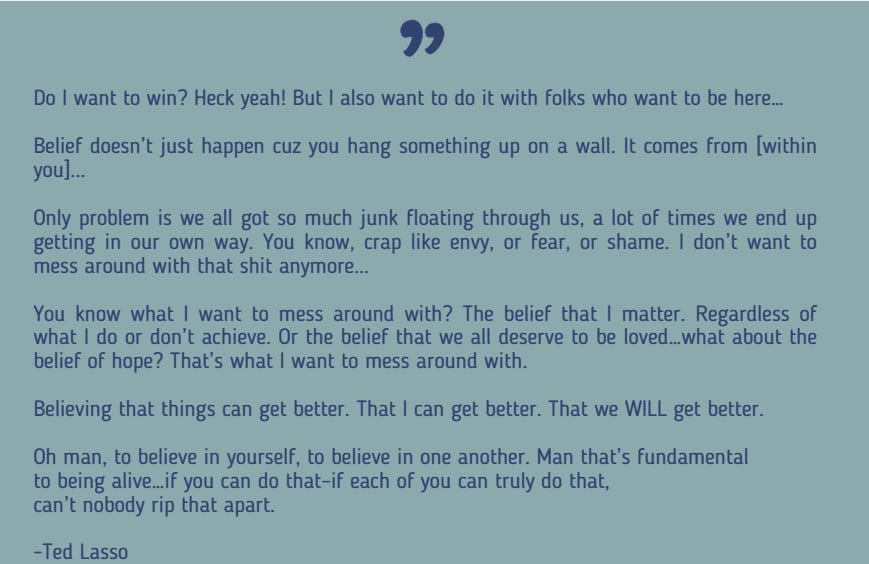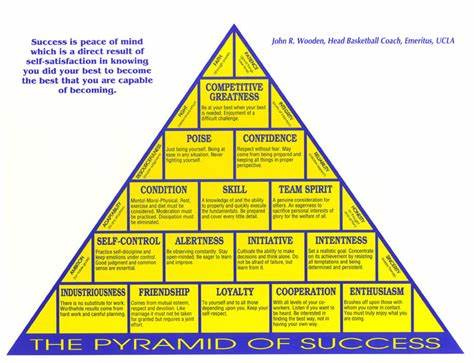"It's not whether you win or lose, but how you play the game."
~Grantland Rice
Sure, you might dismiss this as a trite motivational quote, but it really is a powerful metaphor for the way we show up as leaders, and our ability to enjoy the game of life. Likewise, prioritizing effort over outcome parallels the idea of focusing on the journey rather than the destination.
I spent my childhood running straight from ballet class to little league baseball practice, and eventually added basketball, soccer, track & field, band, theater, local public access television production, and part-time jobs to my juggling act. I never wanted to contain my skills to one bucket. In hindsight, this was an important clue that took me until my 40s to pick up on about embracing the joys and challenges of a nontraditional, multipotentialite career path!
My senior year of high school, I was surprised when my Varsity soccer team voted me co-captain. I didn’t start playing the game until 7th grade, so I wasn’t the most skilled or experienced player. But I did put in consistent effort to improve, and I always encouraged each teammate to see their unique strengths. Perhaps most importantly, I pulled the team together especially after some of our most embarrassing defeats.
I remember one particularly somber bus ride home after losing the last game of our season. It was more than 23 years ago, so I have no recollection of who we lost to, what the score was, or how we could have played better. I remember it was a cold, raw, gray autumn day, and the bus was filled with an unusual, uncomfortable silence. For the seniors, it was particularly heartbreaking knowing we just played (and lost) our last game of our high school career. It was, in fact, the last time we would ever play together as a team. What I remember most of all was breaking the silence with some kind of self-deprecating joke, followed by a tear-filled sentimental statement about how proud I was of our team, regardless of how the season ended. By the end of the bus trip, shrill giggles and pitchy singing filled the parking lot.
From those days in competitive youth sports, I remind myself that we can't control the outcome of the game; we can only control our commitment to consistent practice, the effort that we put in during the game, and the grit and grace to keep our heads up especially when things don’t go our way.
Let’s not kid ourselves—winning the game matters, as do our professional goals. If you go through life focusing entirely on the journey without any destinations in mind, you'll wander around aimlessly. So it's equally important to set your goals, strategize your best path to get there, and anticipate the challenges that will come up along the way. Learning from the losses and celebrating the wins are just as important as enjoying the game itself.
But once you win the game or achieve that major goal, there's often an anticlimactic feeling of letdown and an immediate shift to thinking about what’s next before you even stop to celebrate your accomplishment.
As a New England Patriots fan, I know I’m a bit biased, but I consider Bill Belichick to be one of the greatest coaches of all time, across sports. With that being said, I think Belichick’s biggest weakness is not taking time to truly celebrate what went well in each game, regardless of the final score. He’s famous for post-game interview quotes like:
“If you sit back and spend too much time feeling good about what you did in the past, you’re going to come up short next time.”
Simultaneously feeling good about what went well AND learning from what you could have done better are equally crucial for continuing to improve. It’s the holy grail of leadership: confident humility. One without the other is detrimental to genuine success.
If you focus on putting forth your best effort, you’ll always know (even when you lose) that you did everything you could within your power, and you played to the best of your ability. That's something to feel proud of, no matter the outcome.
This is where Belichick could learn a lot from brilliant fictional coach Ted Lasso. Apple TV’s hit show offers powerful leadership lessons including (spoiler alert) the moment Ted rips apart the team’s “Believe” poster in the episode “Signs” following the abrupt retirement of their superstar player:
Believing in yourself and taking time to enjoy the journey regardless of where it takes you requires intentionality and a practice of mindfulness. Interestingly, what inspired Ted’s profound pep talk were two seemingly opposite moments related to success and “failure”:
First, we see Ted staring at an autographed poster of Coach John Wooden’s Pyramid of Success:
In that moment, the poster does not seem to offer its usual inspiration; rather, Ted begins to drift toward a panic attack thinking about all the ways he’s not living up to this ideal of success. There’s a lot of pressure inherent in consistently striving toward Wooden’s inspiration to “become the best you are capable of becoming.”
Ted is pulled out of the wave of panic by his son who’s calling to own up to a big mistake he made and–most importantly– what he learned from it. This conversation brings Ted back to the present moment and reminds him to follow his own advice: when your biggest, scariest thoughts and emotions are taking over, stop and breathe for 10 seconds. Then repeat until you come back to that unwavering belief in yourself, and the understanding that true success is not the absence of failure but how you handle those failures.
Similarly, NBA player, Giannis Antetokounmpo, recently addressed the concept of failure after his team’s season-ending loss. He offered reporters an important reframe but I would go a step further and encourage Giannis to think about success less as some distant goal that you're taking steps toward, and more of an intentional mindset that allows you to feel successful, even when you lose. This might mean focusing on how you improved a specific skill over the course of the season, how your team formed a tight bond, or the way you gave it your full effort through the final buzzer.
23 years after my days as a Varsity soccer captain, what I remember most is not that final season-ending loss, or even our overall winning record at the end of the season, but the memories of bonding with my teammates–those bus rides to away games, our annual pre-season tournament/camping trip, and, most importantly, cheering each other on during both our highs and our lows. These are the things that we can control, and these are the things that have stuck with me over the years.
So celebrate those wins. Learn from the losses. But don’t lose sight of what really matters. At the end of the bus ride of your life, what will matter most to you?
Stay tuned for Part 2 when I’ll dive into more lessons on the game of life pulled from the bloody brilliant series finale of Ted Lasso.






Bloody brilliantly written! Your articles are so relatable and relevant and also thought-provoking. Thanks! I’ll be waiting for part 2!